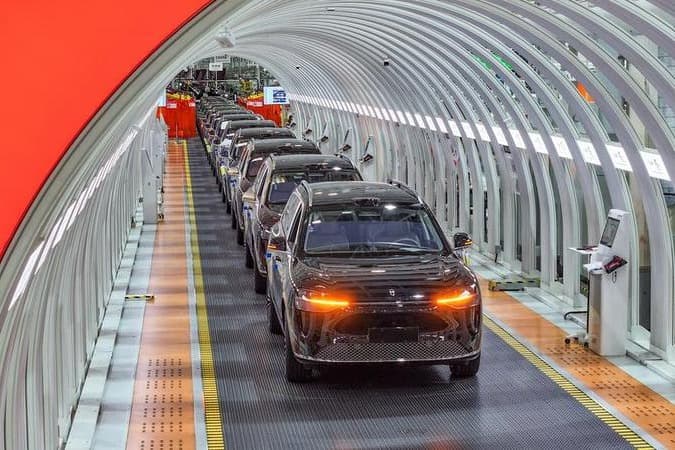We're loading the full news article for you. This includes the article content, images, author information, and related articles.
Beijing's new validation system for New Energy Vehicles aims to standardize overseas exports, a move poised to directly influence vehicle quality, safety, and charging compatibility as Chinese brands deepen their footprint in Kenya's rapidly growing electric vehicle sector.

BEIJING, China – In a strategic move to support the escalating global expansion of its automotive industry, China has officially launched its first comprehensive technical validation system for New Energy Vehicles (NEVs). The initiative, unveiled earlier this month by the China Automotive Technology and Research Center (CATARC), is designed to streamline international charging safety and compatibility for its electric cars, a development with significant implications for emerging markets like Kenya where Chinese EVs are gaining considerable traction.
The system consists of two core components: a globalized electric safety technical assessment and an extensive big data platform for monitoring global charging conditions. According to Gao Jidong, general manager of CATARC's NEV Research and Inspection Center, the platform was developed over four years to address technical inconsistencies faced by Chinese vehicles abroad, including disparate standards, infrastructure, and user habits. The big data platform now covers over 99 percent of major charging operators in more than 50 countries, compiling data from over 500,000 public charging stations.
The move comes as China solidifies its position as the world's dominant force in the EV sector. In 2023, the country's production and sales of NEVs ranked first globally for the ninth consecutive year, accounting for over 60% of the world's total. This manufacturing prowess is increasingly translating into export muscle. As Western markets like the United States and the European Union consider tighter regulations on Chinese EV imports, Africa has emerged as a strategic growth frontier.
In 2023, China's NEV exports to Africa surged by a staggering 291% year-on-year. This influx is visible on Kenyan roads, where brands such as BYD, Chery, and Neta are becoming increasingly common. BYD, the world's largest EV manufacturer, officially entered the Kenyan market in September 2024, introducing several models. Other companies like Chery are planning local assembly lines, a move that could lower costs and accelerate adoption. This expansion is not limited to passenger cars; Chinese firms are also partnering with local companies like BasiGo to electrify public transport with electric buses.
China's new validation system could prove to be a double-edged sword for Kenya. On one hand, it promises to standardize the quality and safety of imported vehicles, ensuring they are better adapted to local conditions. The system's focus on creating localized testing plans for regions like Southeast Asia and the Middle East suggests a similar approach could benefit African markets, mitigating risks related to electrical safety and charging compatibility.
On the other hand, it could give Chinese standards de facto dominance in a market still developing its own regulatory framework. Kenya's e-mobility policy is still in draft stages. In September 2023, the Energy and Petroleum Regulatory Authority (EPRA) issued guidelines for EV charging infrastructure, mandating that charging points be certified and type-approved by the Kenya Bureau of Standards (KEBS). However, there are currently no mandated standards for EV charging connectors in the country, leading to a potential proliferation of incompatible systems.
The introduction of a powerful, data-backed Chinese standard could fill this vacuum, influencing the type of infrastructure Kenya invests in. As of June 2025, Kenya had approximately 300 charging points for a registered stock of 6,442 EVs, a number that highlights the urgent need for coordinated infrastructure development. The government has ambitious plans to install 1,000 charging stations by 2027 and aims for 5% of all vehicle sales to be electric by the end of 2025.
As Chinese automakers deepen their engagement, from setting up assembly plants to partnering on public transit, their technical standards are likely to become deeply embedded in the local ecosystem. This new global validation system is the clearest signal yet that Beijing intends to not only export its vehicles but also the rules that govern them. For Kenyan policymakers and consumers, this underscores the critical need to finalize a robust national e-mobility strategy that ensures interoperability, safety, and long-term sustainability for the country's electric future.
Keep the conversation in one place—threads here stay linked to the story and in the forums.
Sign in to start a discussion
Start a conversation about this story and keep it linked here.
Other hot threads
E-sports and Gaming Community in Kenya
Active 9 months ago
The Role of Technology in Modern Agriculture (AgriTech)
Active 9 months ago
Popular Recreational Activities Across Counties
Active 9 months ago
Investing in Youth Sports Development Programs
Active 9 months ago